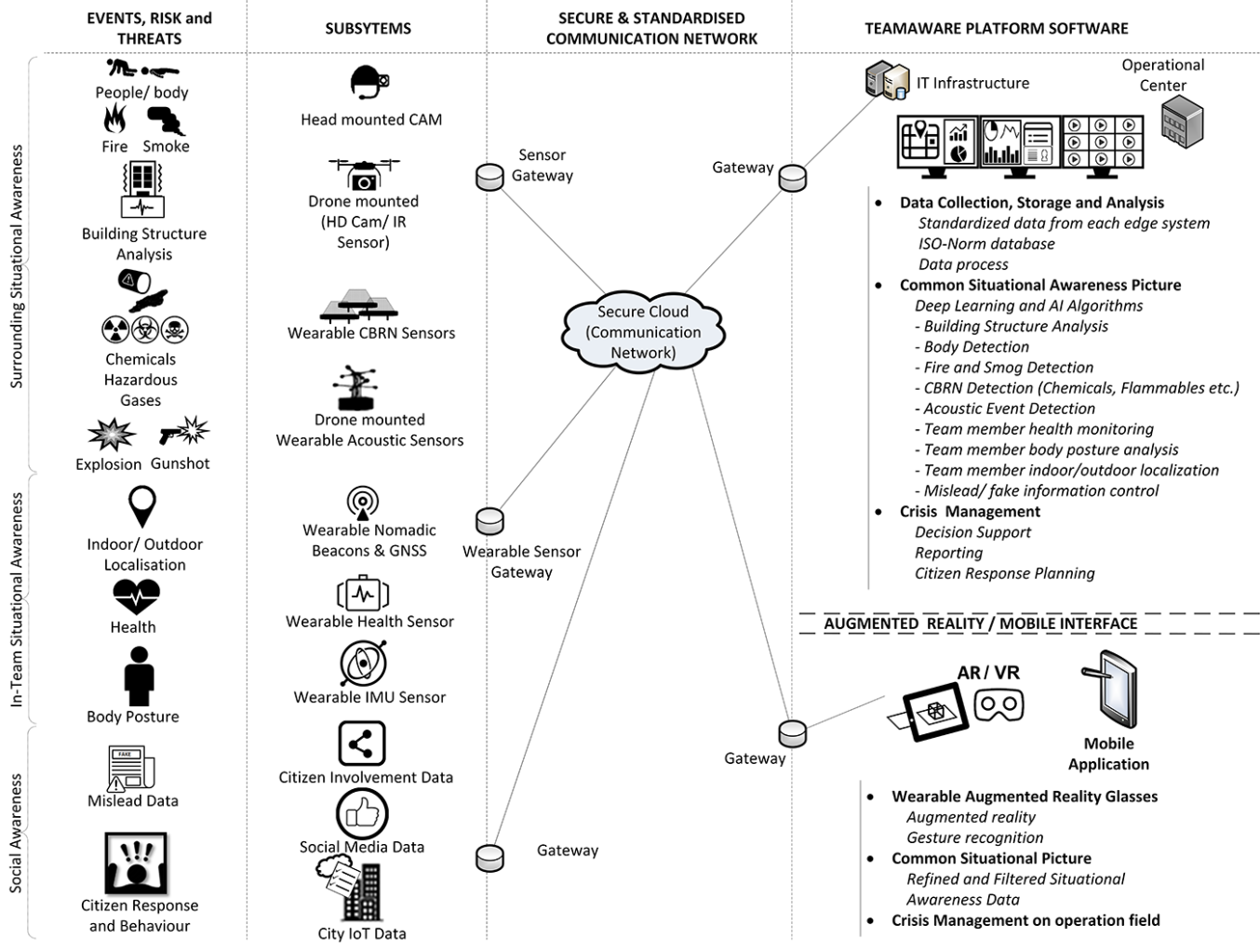Team Awareness Enhanced with Artificial Intelligence and Augmented Reality
Integrated and cost-efficient situational awareness system for first responders from different sectors with heterogeneous and hardly interoperable sensor units including drone mounted, wearable, and external sensor systems.
The project’s primary objective was to characterise the seismic response of masonry and prefabricated buildings in the province of Groningen in northern the Netherlands. Prior to the project, the area had been affected by low-magnitude seismic events related to hydrocarbon extraction activities.
First responders are groups of people, services and organisations with specialised skills and qualifications, whose task is to be the first to arrive at the emergency site to carry out SAR (Search and Rescue) operations and manage crises caused by natural or man-made disasters. Although first responders help to create safe and secure societies by protecting communities, responding to disasters and saving lives, the technologies they use can be inefficient, weak or, in some cases, obsolete during operations.
Compared to the previous situation, the operational capabilities of first responders can be significantly enhanced by advances in technology and engineering, through the use of intelligent sensor systems, wearable devices, data processing and fusion, efficient communication infrastructure and artificial intelligence-based tools.
In this regard, TeamAware has improved the crisis management, flexibility and responsiveness of first responders across multiple sectors by providing real-time, fused, refined and manageable information through highly standardised augmented reality and efficient human-machine interfaces.

The consortium consisted of 24 public and private organisations from 13 different countries, with HAVELSAN (Turkey) as technical coordinator and SIMAVI (Romania) as administrative coordinator. Suppliers and operators of first response services, experts in the digital development of emergency management solutions, and experts in the distribution and evaluation of IoT (sensors) contributed to the development of the project.

The Eucentre Foundation led Work Package WP4, dedicated to the development of the Infrastructure Monitoring System, a monitoring module for the automatic detection of structural damage from data (images or videos) acquired during inspections conducted with drones in critical operations areas.
 Eucentre is a non-profit private law foundation whose mission is to conduct research and provide training and services in earthquake and safety engineering
Eucentre is a non-profit private law foundation whose mission is to conduct research and provide training and services in earthquake and safety engineering  Eucentre promotes science, research and innovation for the benefit of the community, offering targeted methodologies and concrete solutions for prevention, safety and resilience. It collaborates with institutions and companies to disseminate competencies for the common good.
Eucentre promotes science, research and innovation for the benefit of the community, offering targeted methodologies and concrete solutions for prevention, safety and resilience. It collaborates with institutions and companies to disseminate competencies for the common good. Eucentre conducts earthquake engineering research and risk reduction studies via laboratory testing and numerical analysis to enhance seismic performance and develop innovative solutions
Eucentre conducts earthquake engineering research and risk reduction studies via laboratory testing and numerical analysis to enhance seismic performance and develop innovative solutions  Eucentre carries out research activities in earthquake engineering and risk reduction through laboratory testing and numerical analysis, aiming to improve the seismic performance of structures and soils and to develop innovative seismic retrofitting techniques.
Eucentre carries out research activities in earthquake engineering and risk reduction through laboratory testing and numerical analysis, aiming to improve the seismic performance of structures and soils and to develop innovative seismic retrofitting techniques. The Foundation promotes diverse and high-quality training activities aimed at academic and professional contexts, with constantly updated and innovative programs and initiatives designed to meet the evolving needs of the sector and society
The Foundation promotes diverse and high-quality training activities aimed at academic and professional contexts, with constantly updated and innovative programs and initiatives designed to meet the evolving needs of the sector and society  Eucentre ensures communication aimed at informing institutions, professionals, and citizens about ongoing activities and projects, with the goal of disseminating useful and accessible content and knowledge. It contributes to promoting a shared and informed culture of prevention and resilience.
Eucentre ensures communication aimed at informing institutions, professionals, and citizens about ongoing activities and projects, with the goal of disseminating useful and accessible content and knowledge. It contributes to promoting a shared and informed culture of prevention and resilience.
